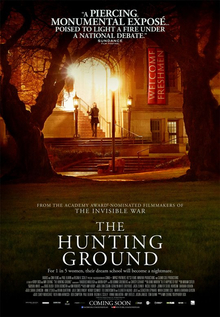
Title IX is the most commonly used name for the federal civil rights law in the United States that was enacted as part of the Education Amendments of 1972. It prohibits sex-based discrimination in any school or any other education program that receives funding from the federal government. This is Public Law No. 92‑318, 86 Stat. 235, codified at 20 U.S.C. §§ 1681–1688.

The Jeanne Clery Disclosure of Campus Security Policy and Campus Crime Statistics Act or Clery Act, signed in 1990, is a federal statute codified at 20 U.S.C. § 1092(f), with implementing regulations in the U.S. Code of Federal Regulations at 34 CFR 668.46.
The Office for Civil Rights (OCR) is a sub-agency of the U.S. Department of Education that is primarily focused on enforcing civil rights laws prohibiting schools from engaging in discrimination on the basis of race, color, national origin, sex, disability, age, or membership in patriotic youth organizations.
Campus sexual assault is the sexual assault, including rape, of a student while attending an institution of higher learning, such as a college or university. The victims of such assaults are more likely to be female, but any gender can be victimized. Estimates of sexual assault, which vary based on definitions and methodology, generally find that somewhere between 19 and 27% of college women and 6–8% of college men are sexually assaulted during their time in college.
The Pennsylvania Coalition Against Rape (PCAR) is the oldest anti-rape coalition in the United States, working to eliminate all forms of sexual violence and advocating for the rights and needs of victims.
Annie Elizabeth Clark is a women's rights and civil rights activist in the United States. She was one of the lead complainants of the 2013 Title IX and Clery Act charges lodged against the University of North Carolina at Chapel Hill, claiming that the institution violated the law by the way they handled sexual assault complaints. Clark and Andrea Pino, then a fellow UNC student and also a victim of sexual assault, launched a nationwide campaign to use Title IX complaints to force U.S. universities to address sexual assault and related problems more aggressively. Clark is co-founder with Pino of End Rape on Campus, an advocacy group for victims of campus sexual assault.
Andrea Lynn Pino (born February 15, 1992) is an American women's rights and civil rights activist, author, and a public scholar on issues of global gender based violence, media framing of violence, gender and sexuality, and narratives of survivorhood. She is the queer daughter of Cuban refugees and has stated that she is a survivor of sexual assault.

Senate Bill 1752, more commonly known as the Military Justice Improvement Act (MJIA), was introduced by U.S. Senator Kirsten Gillibrand (D-N.Y.) in 2013 as an attempt to reform procedures for determinations to proceed to trial by court-martial for certain offenses under the Uniform Code of Military Justice and for other purposes. The focus of the bill is to address the way that sexual assault in the United States military is handled through the military justice system and the chain of command. The bill has been criticized as potentially leading to a decrease in sexual assault prosecutions and in the protections offered to alleged victims of sexual assault. A similar bill that keeps Commanders in charge has been championed by Senator Claire McCaskill, D-Missouri.
The White House Task Force to Protect Students from Sexual Assault was formed on January 22, 2014, after President Barack Obama directed the Office of the Vice President of the United States and the White House Council on Women and Girls to "strengthen and address compliance issues and provide institutions with additional tools to respond to and address rape and sexual assault". The Task Force is part of a wider federal move to bring awareness to sexual violence on American campuses, which also included the Office for Civil Rights release of a list of American higher education institutions with open Title IX sexual violence investigations and the It's On Us public awareness campaign. The co-chairs of the Task Force are Vice President Joe Biden and Senior Advisor to the President Valerie Jarrett.
In April 2013, Occidental College was one of the first in a series of US higher education institutions to be accused of failing to take campus sex crimes seriously by improperly reporting and adjudicating sexual assaults and covering up rapes. Occidental students and faculty filed two federal complaints against the College, alleging violations of Title IX of the US Education Amendments of 1972 and the Clery Act.

Mattress Performance (Carry That Weight) (2014–2015) was a work of endurance/performance art which Emma Sulkowicz conducted as a senior thesis during the final year of a visual arts degree at Columbia University in New York City.

The Hunting Ground is a 2015 American documentary film about the incidence of sexual assault on college campuses in the United States and the reported failure of college administrations to deal with it adequately. Written and directed by Kirby Dick and produced by Amy Ziering, it premiered at the 2015 Sundance Film Festival. The film was released on February 27, 2015, an edited version aired on CNN on November 22, 2015, and was released on DVD the week of December 1, 2015. It was released on Netflix in March 2016. Lady Gaga recorded an original song, "Til It Happens to You," for the film, which was nominated for the Academy Award for Best Original Song.
Know Your IX is an American political advocacy group founded in 2013. It aims to inform students of their right to an education free from gender-based violence under Title IX of the Education Amendments of 1972, which prohibits sex discrimination in institutions receiving federal government funding. The organization also seeks to influence legislation and policy to improve federal enforcement of Title IX and treatment of student victims.
Families Advocating for Campus Equality (FACE) is an American advocacy group whose stated goal is to ensure fairness and due process for all parties involved in allegations of sexual misconduct on college and university campuses. FACE was started by Sherry Warner Seefeld and two other mothers who say their sons were falsely accused of sexual misconduct on their college campuses.
The Safe Campus Act was introduced to the US House of Representatives by Matt Salmon (R-AZ), Pete Sessions (R-TX), and Kay Granger (R-TX) on July 29, 2015. The bill aims to prevent colleges from pursuing internal investigations in cases of campus sexual assault. This restriction would legally require alleged victims of sexual assault to report the crime to the police in order to see justice on campus.
In April 2013, Emma Sulkowicz, an American fourth-year visual arts major at Columbia University in New York City, filed a complaint with Columbia University requesting expulsion of fellow fourth-year student and German national, Paul Nungesser, alleging he had raped Sulkowicz in her dorm room on August 27, 2012. Nungesser was found not responsible by a university inquiry.
A sexual assault response team is an organized group of individuals, professionals, and officials who promote a community-wide approach to end sexual violence and help victims of sexual assault to navigate the complexities of medical, emotional, and legal issues along with the associated procedures. Because a sexual assault sometimes involves physical injury and often leaves the victim in emotional shock, these eponymous local organizations are formed and advertised for quick reference and rapid assistance.
After a sexual assault or rape, victims are often subjected to scrutiny and, in some cases, mistreatment. Victims undergo medical examinations and are interviewed by police. If there is a criminal trial, victims suffer a loss of privacy, and their credibility may be challenged. Victims may also become the target of slut-shaming, abuse, social stigmatization, sexual slurs and cyberbullying. These factors, contributing to a rape culture, are among some of the reasons that may contribute up to 80% of all rapes going unreported in the U.S, according to a 2016 study done by the U.S. Department of Justice.
Stop Sexual Assault in Schools is a United States non-profit organization that advocates for K–12 students’ right to an education free from sexual harassment and sexual assault. Sexual assault and severe or pervasive sexual harassment are types of sex discrimination prohibited under Title IX of the Education Amendments of 1972, a civil rights law that prohibits sex discrimination in any education program that receives federal funding. SSAIS accomplishes its mission by creating and distributing free education programs, filing pro bono civil rights complaints with the Office for Civil Rights (OCR), collaborating with national gender equity organizations, supporting legislative and legal initiatives, working with communities and families to bring schools into Title IX compliance, and educating the media about how sexual harassment and sexual violence in K–12 schools can violate students’ rights.

The Sexual Violence and Misconduct Policy Act is a provincial law in British Columbia, Canada, requiring publicly funded post-secondary institutions in the province to implement a policy addressing campus sexual violence and sexual misconduct. Post-secondary institutions subject to Act 23 must develop a policy that covers several specific types of sexual misconduct involving a student, sexual misconduct prevention, and institutional responses to sexual misconduct. Post-secondary institutions must make their policies publicly available on their website. The legislation was passed in 2016 and came into force in 2017, by which time all post-secondary institutions subject to the Act were required to have developed a policy.





